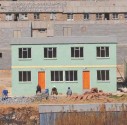La segregación, los guetos y la integración social urbana: mitos y claves
Predominan en el medio académico y político las nociones "naturalistas" sobre la segregación social del espacio en las ciudades latinoamericanas. Las desigualdades o el "clasismo", hechos fuertes y persistentes, harían de la segregación algo inevitable; y de las propuesta para controlarla, algo ilusorio. En contraposición, los autores del artículo argumentan que no existen impedimentos culturales, sociológicos ni económicos para reducir la segregación.






